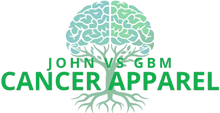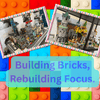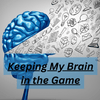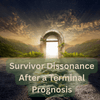When “No Evidence of Disease” Isn’t What It Seems: The Quiet War Inside

When my oncologist said the words “No Evidence of Disease,” I expected relief to wash over me like sunlight after a storm. I thought I would feel victorious, like someone who had outrun a monster.
But instead, I felt something else entirely.
Disoriented. Suspicious. Maybe even a little betrayed by my own expectations.
Because when you are diagnosed with Glioblastoma, you quickly learn that “No Evidence of Disease” (NED) does not mean you are cancer-free. It means something more ambiguous, more fragile. It means the scans are clean. It means, for now, nothing is lighting up. But nobody is opening up your brain to poke around. Nobody is declaring the enemy gone.
They are making an educated guess.
NED and Glioblastoma: A Truce, Not a Treaty
Glioblastoma does not play by the rules. It is notorious for being sneaky, aggressive, and nearly impossible to fully eliminate. So when the scans come back clean, doctors cautiously say, “No Evidence of Disease.”
But for those of us living it, that phrase is a complicated gift.
It feels like being told the lion that has been stalking you is no longer in sight—but nobody knows for sure. You are still standing in the tall grass. You are still listening for rustling. You are still afraid to turn your back.
Because deep down, you know: NED does not mean you are safe. It means you are in a moment of calm, but the war is not over.
My Time with Optune
I wore Optune for over a year. Every day. Every night. I shaved my head without hesitation, changed the arrays, carried the batteries, explained it to strangers in grocery stores, endured the stares, the heat, the inconvenience. It was part of the deal—part of the price I was willing to pay for a shot at more time.
And to be clear, I still believe in what Optune does. I believe in the science, the statistics, the hope it offers.
But I also believe in something else: my gut.
And my gut was telling me that something had shifted.
Optune Was Saving Me—But Was It Also Stealing Me?
When the words “No Evidence of Disease” were spoken, I felt like I should keep going harder. Wear Optune longer. Stick with the plan.
But instead, I found myself questioning everything.
I was exhausted—not just physically, but emotionally. I missed feeling like a person instead of a patient. I missed sleeping on my side. I missed hugging my husband without wires in between us. I missed the feel of air on my scalp, of freedom in my day.
Wearing Optune kept me alive—but at some point, I had to ask myself: Am I still surviving, or am I just existing?
Am I Playing Russian Roulette?
That is the question that haunted me when I made the decision to take off Optune.
Because in the world of Glioblastoma, every decision carries risk. Optune is one of the few weapons we have—and removing it, even for a while, feels like stepping out into open fire.
Am I playing Russian roulette with my life?
Maybe.
But here is the truth: living with Glioblastoma means I am already playing Russian roulette every single day. With or without Optune, I carry that risk.
So instead of trying to out-run the bullet, I have chosen—for now—to live like the trigger might never be pulled.
What Normalcy Means Now
It is strange how the definition of “normal” shifts after a cancer diagnosis.
Before, normal was work, errands, mindless stress about bills or what to make for dinner. Now, normal is deeper. It is sitting outside with my dog without worrying about battery levels. It is feeling my scalp touch the pillow. It is spontaneous laughter, unplanned mornings, leaving the house without a medical device strapped to my chest.
It is not a return to my old life. It is a reclaiming of my right to have one at all.
The Emotional Weight of "Good News"
People hear “No Evidence of Disease” and assume that means closure. Healing. A happily-ever-after.
But for me—and for many others in this space—it means more anxiety, not less. It means wondering if I should be doing more, or less. If I am ungrateful for wanting a break. If I am reckless for daring to feel joy.
It is like being handed a fragile, beautiful glass sculpture and being told, “Be happy—but do not drop it.”
There is no roadmap for this part. Just a mess of emotion, memory, and instinct.
I Want My Life Back—Even If I Risk It
And that is the rawest truth of all.
I want my life back. Not the one before cancer. But the one that feels like mine.
A life with presence, with purpose, with peace. A life where I am not defined by cords, appointments, and statistics. A life where I can dare to dream, plan, hope.
And if the cost of that is risk—then yes, I am willing to pay it.
Because I have spent the last year fighting like hell to stay alive. And now, I want to remember what I was fighting for.
A Message to Fellow Fighters
If you are in this place—this murky, lonely, confusing place of NED—I want you to know you are not alone.
It is okay to feel what you feel. To celebrate and grieve at the same time. To want to be vigilant and free. To crave control and release.
There is no right way to live with Glioblastoma. There is only your way. And that is brave. That is enough.
So whether you keep the device on or take it off, whether you march or rest, fight or float—just know this:
You have already survived so much.
You have every right to choose how the rest of your story unfolds.


 NEW ARRIVALS
NEW ARRIVALS APPAREL
APPAREL GIFT AND HOME
GIFT AND HOME COLLECTION'S
COLLECTION'S HOPE HUB
HOPE HUB BLOG
BLOG




I had the option of wearing Optune and I chose not to wear it. You described NED perfectly. Every time it gets close to my next MRI I start getting anxious. My next MRI is June 17th and I’m praying that everything is still stable. Trusting in God!
I appreciate your post!
I’m NED and this amazingly, perfectly, scary explains me right now. I’ve begun saying physically wonderful or great but emotionally hard. Truth. My soul feels heard reading this- thank you
💕🙏🏻💕